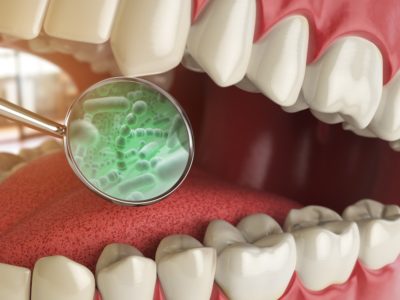Halitosis (Bad Breath) Treatment
Chronic bad breath, clinically known as halitosis, can be uncomfortable and embarrassing, but it is treatable. With deep cleanings and professional guidance, you don't have to go on living with bad breath.
Bad Breath/Halitosis Treatment
An estimated 1 in 4 people globally suffer from chronic bad breath/ halitosis. It’s a common problem and while chronic bad breath can cause embarrassment and anxiety, there are remedies.
Halitosis is caused by oral bacteria that is trapped in your mouth for an extended amount of time. The key to dealing with it is treating the root of the problem – removing the source of the odor. Most over-the-counter remedies such as mouthwash, mints, and gum can only cover up the issue.
At Port Washington Family Dentistry, we treat halitosis with a professional cleaning and oral cleanse to reach crevices not normally accessed by regular brushing and flossing. Occasionally, a deep cleaning, consisting of scaling and root planing, and potentially tongue scraping, is necessary to remove bacteria trapped below the gum line.
We invite you to learn more about how to treat halitosis by visiting our office or giving us a call at 262-284-9011.

-
What causes bad breath?
Bad breath, also known as halitosis, can result from poor dental health habits and can be made worse by certain foods. If food particles are left in the mouth, their decomposition releases sulfur compounds, which cause bad breath. If regular brushing, flossing, and hydration don’t solve it, the best solution is to see your dentist for a deep cleaning.
-
What is the best chewing gum for bad breath?
Chewing gum can help remedy bad breath until you are able to see your dentist for a deep cleaning. The best chewing gum is sugar-free chewing gum. The sweetness of this gum comes from alternatives to sugar such as xylitol so it doesn’t cause tooth decay.
Besides masking bad breath, chewing sugar-free gum helps protect your teeth and gums between meals. Teeth are more at risk of an acid attack immediately after meals. Chewing gum helps to reduce acid and the harm it causes. It prompts the mouth to produce more saliva, which is the mouth’s natural defense against acid.
-
Does smoking cause bad breath?
Yes, smoking is a significant cause of bad breath (halitosis). Many smokers suffer from bad breath from time to time. Heavy smokers are usually more frequently affected, but occasional smokers also get bad breath.
The reasons smoking leads to bad breath are multifaceted:
- Tobacco Odor: Tobacco products have a strong odor that can linger in the mouth and the breath. The smoke from cigarettes, cigars, or pipes can stick to the mouth, gums, teeth, and tongue, leading to a persistent unpleasant smell.
- Dry Mouth: Smoking affects saliva production, often leading to a condition known as dry mouth (xerostomia). Saliva is essential for cleansing the mouth and removing particles that can cause foul odors. A reduction in saliva can exacerbate bad breath.
- Increased Risk of Gum Disease: Smoking is a well-known risk factor for gum (periodontal) disease, a significant source of bad breath. Gum disease occurs when the gums are infected and inflamed, leading to the destruction of the bone and tissue that support the teeth. The bacteria associated with gum disease produce foul-smelling waste products that contribute to bad breath.
- Buildup of Plaque and Tartar: Smokers are more likely to have plaque and tartar buildup on their teeth, which can harbor odor-causing bacteria. Regular dental cleanings can help manage this, but smoking continually promotes this buildup.
- Delayed Healing: Smoking impairs the body’s ability to heal, including the healing of the mouth and gums from any infections, extractions, or oral surgeries. This can prolong or exacerbate conditions that contribute to bad breath.
Quitting smoking can significantly improve oral health and reduce bad breath.
Questions About Bad Breath Treatment?
If you have more questions about halitosis/bad breath treatment, or if you would like to schedule an appointment, contact our office and we will be happy to discuss further.

